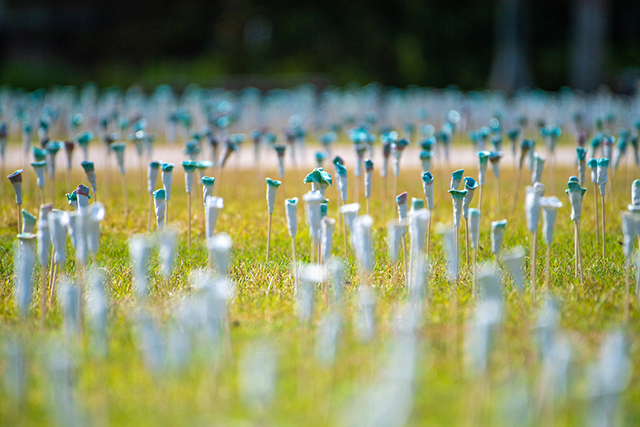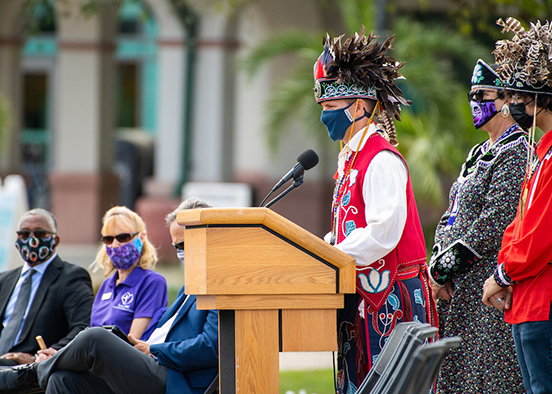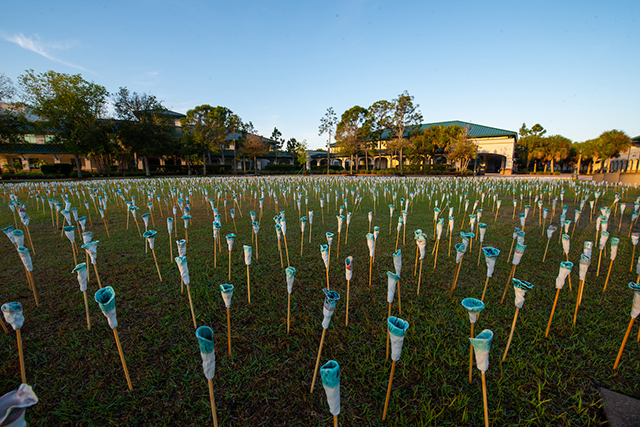Alfred Diaz, proud Marine, family patriarch and grandfather to FGCU sophomore Alessio L. Luna, died of COVID-19 in October.
Naomi Hooker, loving grandmother and trusted confidante to senior Brittany Hall, died of COVID-19 in September.
Yolanda Clugh, matriarch of a Jamaican immigrant family and grandmother to junior Aaron Lowe, died of COVID-19 in April.
These names represent just a few of the countless people on the minds and in the hearts of students as they reflect on the thousands of ceramic votives dotting FGCU’s Great Lawn. Humble handmade symbols of individuals lost, the tributes collectively create a sweeping visual representation of the magnitude of the global pandemic’s toll.

The art installation, “Field of Remembrance, Cathedral of Sky,” which remains in place through April 5, was dedicated March 23 as part of “FGCU Remembers: The COVID Memorial Project.” A related interactive exhibit called “What We Lost, What We Learned, What We Hope For” is on display in the ArtLab Gallery.
Another gathering at 4 p.m. March 28 will feature FGCU President Mike Martin and other speakers as well as performances by musicians from the Bower School of Music & the Arts. Limited community participation is allowed, and all visitors to the installation and the ArtLab must abide by FGCU requirements for wearing masks and maintaining social distance.
Seeing the 10,000 handmade tributes shaped like calla lilies spread out in the grass “really puts things into perspective,” said Aaron Lowe, an environmental science major from Miami who had a special relationship with his late grandmother. She helped him stay in school by paying some of his tuition.
“It’s a wakeup call,” he said of the memorial. “To stay clean, but also not to live in fear but be aware. Don’t take things for granted.”

a confederation of six Native American nations, at the memorial dedication. Representatives of diverse faiths came to speak at the ceremony.
A similar theme echoed in the remarks of ministers from diverse faiths invited to speak at the dedication about what their communities have lost and learned during the pandemic. Professors Maria Roca and Patricia Fay proposed and organized “FGCU Remembers” as a public expression of collective grief and an opportunity to honor those lost to COVID-19.
“Family matters more than we realized,” William Glover, pastor of Mount Hermon Ministries in Fort Myers, said in his address. “When the community works together, we can do amazing things. If we take care of ourselves, we take care of each other. We are all vulnerable. We are all connected and interdependent. We are all one race, the human race.”
Rickey Anderson, pastor of Followers of Christ Fellowship Ministries in Fort Myers, also called for people to stand by each other in these uncertain times. He then spontaneously broke into a soaring interpretation of the gospel song “I Know Who Holds Tomorrow”:
“I don’t worry o’er the future
For I know what Jesus said
And today I’ll walk beside him
For he knows what lies ahead.”
FGCU alumnus David Webb (’04, Environmental Studies) represented the Haudenosaunee, a confederation of six Native American nations he is part of. Speaking the Tuscarora language and explaining in English, he recited the Gano:nyok, a traditional address of thanks given before important gatherings.
He noted that America’s Indigenous peoples suffered through waves of infectious disease throughout their history, long before the coronavirus began to take a disproportionate toll on them.
“Looking out across at all these sculptures that represent human beings, it is so incredibly impactful to have this visual representation of the people just in Florida who have been victims of this pandemic,” he said. “Looking at all the lives represented here makes me think of our ancestors who also succumbed in really large numbers to pandemics. Losing 90% of your population, you would lose your wisdom keepers, your faith keepers, those who understand the arts, those who understand tool making, those who understand agriculture. Our culture was decimated by waves of pandemics.”
The coronavirus has taken an especially harsh toll on the 574 recognized tribes of First Nations people.
Indigenous Americans are dying of COVID-19 at twice the rate of white Americans, it has been widely reported; nationwide, one in every 475 Native Americans has died from COVID since the start of the pandemic, compared with one in every 825 white Americans and one in every 645 Black Americans.
Brittany Hall, a senior majoring in integrated studies, attended the dedication to honor all those lost but especially her 83-year-old grandmother Naomi Hooker, who perished from COVID-19 in September. Hall’s grandfather died shortly afterward from non-virus related causes. They were like another set of parents to her — “we talked about everything,” she said.
“This is a beautiful way to represent everything that has happened,” Hall said. “My grandmother was a fighter. In the hospital, she said ‘I’m going to make it.’ She was determined to pull through. What I’ve learned is that it’s important to tell those you love that you love them. And that we’re not alone. Everyone who is grieving right now, the whole world is grieving with them.”

Like many who lost loved ones, Alessio Luna, an Honors student in criminal justice and political science, was unable to be with his grandfather, Alfred Diaz, when died in October because of hospital restrictions. When Luna had a chance to say goodbye by phone, all he could hear in response was the beeping of the machines keeping Diaz alive.
“I was able to relay the message to him that I loved him,” said Luna, who fondly recalled time spent with his grandfather watching “Law & Order” reruns and Mets games. A Marine Corps veteran, 75-year-old Diaz was living in good health in a VA nursing home when he and others on his floor contracted the virus apparently from an infected staff member, according to Luna.
“His death was unexpected, tragic and traumatic on our family as well as myself,” Luna said. “His death could have been preventable.”
Luna said he hoped to achieve a sense of healing from visiting the campus memorial and felt that his grandfather would be there with him in spirit.
His hope for healing is shared by FGCU junior Kelly Maguire, an Honors psychology major who helped install 1,000 of the ceramic votives on the lawn. She has lost five friends to various causes during the pandemic. None succumbed to infection. They were victims of suicide, overdose and domestic violence, she said. The ripple effects of isolation and lost human connections on mental health are compounding the pandemic’s impact on physical health.
“There’s a lot of grief I didn’t get to process properly, or even just to be able to appreciate them for each loss,” said Maguire.
“I’m hoping this memorial will be a chance for me to able to really grieve their loss and honor them in the process. I think this will bring a lot of healing to students, faculty and the community.”
Maguire, who planned to speak at a Palm Sunday ceremony at the memorial, hoped the “FGCU Remembers” project would draw attention to the pandemic’s widespread psychological impact and the need for more resources for communities to cope with it. An advocate for mental health and for therapy, she’s involved in Active Minds, a nationwide organization that helps college students struggling with mental illness.
“For the first time ever, the entire world has experienced some degree of anxiety all at once,” she said. “If you live in that state of mind of grief all the time it can be hard to function all day. There has been more talk about mental health, and it’s become less stigmatized. But there’s definitely more work to do in the future.”
Video produced by Tim Clark/FGCU